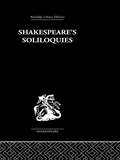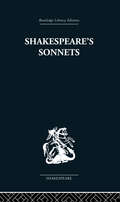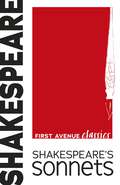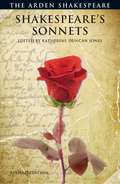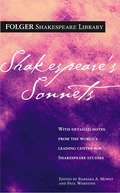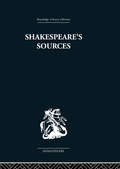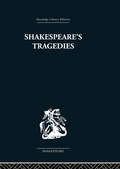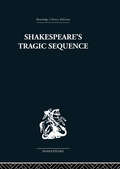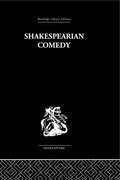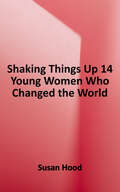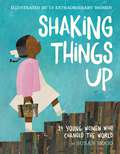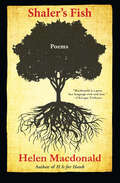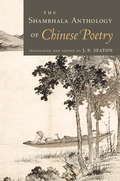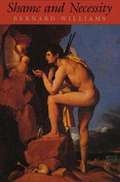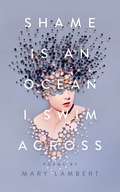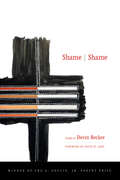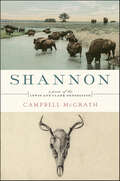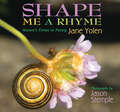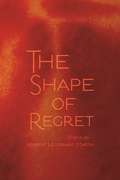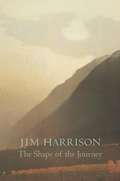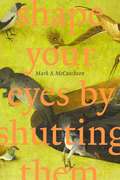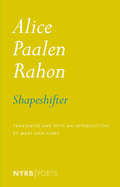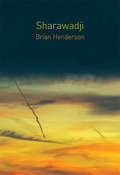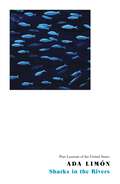- Table View
- List View
Shakespeare's Soliloquies
by Wolfgang Clemen Ingeborg BoltzFirst published in 1987. Often the best known and most memorable passages in Shakespeare's plays, the soliloquies, also tend to be the focal points in the drama. Twenty-seven soliloquies are examined in this work, illustrating how the spectator or reader is led to the soliloquy and how the drama is continued afterwards. The detailed structure of each soliloquy is discussed, as well as examining them within the structure of the entire play - thereby extending the interpretation of the work as a whole.
Shakespeare's Sonnets (Unwin Critical Library)
by Kenneth MuirThis edition first published in 1979. Discussing Shakespeare's sonnets in relation to sonnets by Italian, French and English poets, Kenneth Muir shows how they were influenced by Shakespeare's reading of Sidney, Erasmus and Ovid and discusses their art in terms of construction, sound patterns and imagery. He considers the relationship of the sonnets to Shakespeare's dramatic writing, while stressing the dramatic element in the sonnets themselves. Finally he surveys the changing attitudes to the sonnets during the last three centuries.
Shakespeare's Sonnets (First Avenue Classics ™)
by William ShakespeareAlong with writing comedic and dramatic plays, William Shakespeare was also a master poet. Using the sonnet structure (three quatrains and a final couplet composed in iambic pentameter), he composed 154 poems covering timeless themes of love, beauty, and mortality. The poems' subjects—the Fair Youth, the Dark Lady, and the Rival Poet—have become nearly as famous as the sonnets themselves. While not the first to write poems in sonnet form, Shakespeare's sonnets are considered the most influential examples of this style. The sonnets were first published in a 1609 quarto; this is an unabridged collection of all of Shakespeare's iconic sonnets, including Sonnet 18 ("Shall I compare thee to a summer's day?"), Sonnet 116 ("Let me not to the marriage of true minds/ Admit impediments"), and Sonnet 130 ("My mistress' eyes are nothing like the sun").
Shakespeare's Sonnets (The Arden Shakespeare, Third Series)
by Katherine Duncan-Jones William ShakespeareThe author Katherine Duncan Jones explores the issues of sexuality to be found in poems of Shakespeare, making this a truly modern edition for todays readers and students. This revised edition has been updated and corrected in the light of new scholarship and critical thinking since its first publication.
Shakespeare's Sonnets (The Folger Shakespeare Library)
by William Shakespeare Barbara A. Mowat Paul WerstineSavor the most celebrated love poems in the English language. Written almost 400 years ago, the sonnets of William Shakespeare are passionate and exalted, rich in imagery and alliteration, and full of mystery and intrigue. This selection presents all 154 sonnets composed from 1593-1601. In words and rhyme, he reveals his infatuation with the "Dark Lady," his relationship with a rival poet, and his private thoughts on love, death, beauty, and truth: timeless themes that span the centuries to touch our hearts today.
Shakespeare's Sources: Comedies and Tragedies
by Kenneth MuirFirst published in 1957. This book finds discovers what the sources to Shakespeare's Comedies and Tragedies really were, considers the dramatic reasons for Shakespeare's departure from them and provides many examples of the way in which he made use of his general reading for particular scenes and speeches. Kenneth Muir shows that Shakespeare frequently uses more than one source and sometimes as many as eight.
Shakespeare's Tragedies
by G B HarrisonFirst published in 1951. G B Harrison here recognizes that Shakespeare's tragedies were intended for performance in a theatre and that the playwright's conspicuous gift among his contemporaries was a sympathy for joy and sorrow, pity and terror, and right and wrong of his people. The plays covered are: Titus Andronicus, Romeo and Juliet, Julius Caesar, Hamlet, Troilus and Cressida, Othello, King Lear, Macbeth, Antony and Cleopatra, Coriolanus and Timon of Athens.
Shakespeare's Tragic Sequence
by Kenneth MuirFirst published in 1972. The emphasis of this book is that each of Shakespeare's tragedies demanded its own individual form and that although certain themes run through most of the tragedies, nearly all critics refrain from the attempt to apply external rules to them. The plays are almost always concerned with one person; they end with the death of the hero; the suffering and calamity that befall him are exceptional; and the tragedies include the medieval idea of the reversal of fortune.
Shakespearian Comedy
by H. B. CharltonFirst published in 1938. This is a survey of Shakepeare's comedies which illustrates the playwright's increasing grasp on the art and idea of comedy. Themes, characters and plays covered include: Romanticism in Shakespearian comedy; Shakespeare's Jew, Falstaff, The Taming of the Shrew, A Midsummer Night's Dream, and The Dark Comedies.
Shaking Things Up: 14 Young Women Who Changed the World
by Susan HoodIn this book of poems, you will find Mary Anning, who was just thirteen when she unearthed a prehistoric fossil. You’ll meet Ruby Bridges, the brave six-year-old who helped end segregation in the South. And Maya Lin, who at twenty-one won a competition to create a war memorial, and then had to appear before Congress to defend her right to create. And those are just a few of the young women included in this book. <p><p>Readers will also hear about Molly Williams, Annette Kellerman, Nellie Bly, Pura Belpré, Frida Kahlo, Jacqueline and Eileen Nearne, Frances Moore Lappé, Mae Jemison, Angela Zhang, and Malala Yousafzai—all whose stories will enthrall and inspire. This poetry collection was written, illustrated, edited, and designed by women and includes an author’s note, a timeline, and additional resources. With artwork by award-winning and bestselling artists including Selina Alko, Sophie Blackall, Lisa Brown, Hadley Hooper, Emily Winfield Martin, Oge Mora, Julie Morstad, Sara Palacios, LeUyen Pham, Erin Robinson, Isabel Roxas, Shadra Strickland, and Melissa Sweet.
Shaking Things Up: 14 Young Women Who Changed the World
by Susan Hood“Each poem and illustration shines with a personality all its own.” —Shelf Awareness (starred review)“This book has definitely made an impact on my life.” —Kitt Shapiro, daughter of Eartha KittFresh, accessible, and inspiring, Shaking Things Up introduces fourteen revolutionary young women—each paired with a noteworthy female artist—to the next generation of activists, trailblazers, and rabble-rousers.From the award-winning author of Ada’s Violin and Lifeboat 12, Susan Hood, this is a poetic and visual celebration of persistent women throughout history.In this book of poems, you will find Mary Anning, who was just thirteen when she unearthed a prehistoric fossil. You’ll meet Ruby Bridges, the brave six-year-old who helped end segregation in the South. And Maya Lin, who at twenty-one won a competition to create a war memorial, and then had to appear before Congress to defend her right to create.And those are just a few of the young women included in this book. Readers will also hear about Molly Williams, Annette Kellerman, Nellie Bly, Pura Belpré, Frida Kahlo, Jacqueline and Eileen Nearne, Frances Moore Lappé, Mae Jemison, Angela Zhang, and Malala Yousafzai—all whose stories will enthrall and inspire. This poetry collection was written, illustrated, edited, and designed by women and includes an author’s note, a timeline, and additional resources.With artwork by award-winning and bestselling artists including Selina Alko, Sophie Blackall, Lisa Brown, Hadley Hooper, Emily Winfield Martin, Oge Mora, Julie Morstad, Sara Palacios, LeUyen Pham, Erin Robinson, Isabel Roxas, Shadra Strickland, and Melissa Sweet.A 2019 Bank Street Best Book of the Year Named to the 2019 Texas Topaz Nonfiction Reading ListSelected for CCBC Choices Book 2019Selected as a Notable Social Studies Trade Books for Young People 2019Named to the Cuyahoga County Public Library’s 2018 list of Great Books for Kids2020-2021 South Carolina Picture Book Award Nominee
Shaler's Fish: Poems (Books That Changed the World)
by Helen Macdonald“Devoted readers of H Is for Hawk will find Macdonald’s gift for stunning language, patient curiosity, and expansive wisdom on full display in her poems.”—Publishers WeeklyFrom the naturalist and author of the New York Times bestseller H is for Hawk, which appeared on more than twenty-five Best Books of the Year lists, Shaler’s Fish is a collection of poetry that roams both the outer and inner landscapes of the poet’s universe, seamlessly fusing reflections on language, science, and literature with the loamy environments of the natural worlds around her. Moving between the epic (war, history, art, myth, philosophy) and the specific (CNN, Ancient Rome, Auden, Merleau-Ponty), Helen Macdonald examines with humor and intellect what it means to be awake and watchful in the world. These are poems that probe and question, within whose nimble ecosystems we are as likely to encounter Schubert as we are “a hand of violets,” Isaac Newton as a “winged quail on turf.” Nothing escapes Macdonald’s eye and every creature herein—from the smallest bird to the loftiest thinker—holds a significant place in her poems.“Macdonald is a poet of vision and sound, oracular one moment and playful the next, whose first love and only loyalty is to the music of words.” –O, the Oprah Magazine
The Shambhala Anthology of Chinese Poetry
by J. P. SeatonIn traditional Chinese culture, poetic artistry held a place that was unrivaled by any other single talent, and was a source of prestige and even of political power. In this rich collection, J. P. Seaton introduces the reader to the main styles of Chinese poetry and the major poets, from the classic Shih Ching to the twentieth century. Seaton has a poet's ear, and his translations here are fresh and vivid.
Shame and Necessity: Volume 57 of Sather Classical Lectures
by Bernard WilliamsWe are more like the ancients than we are prepared to acknowledge, and only when this is understood can we properly grasp our most important differences from them, such as our rejection of slavery. The author is a philosopher, but much of his book is directed to writers such as Homer and the tragedians, whom he discusses as poets and not just as materials for philosophy. At the center of his study is the question of how we can understand Greek tragedy at all, when its world is so far from ours. Williams explains how it is that when the ancients speak, they do not merely tell us about themselves, but about ourselves. Shame and Necessity gives a new account of our relations to the Greeks, and helps us to see what ethical ideas we need in order to live in the modern world.
Shame Is an Ocean I Swim Across: Poems by Mary Lambert
by Mary LambertBeautiful and brutally honest, Mary Lambert's poetry is a beacon to anyone who's ever been knocked down—and picked themselves up again. In verse that deals with sexual assault, mental illness, and body acceptance, Ms. Lambert emerges as an important new voice in poetry, providing strength and resilience even in the darkest of times.
Shame / Shame
by Devin Becker"Devin Becker's Shame | Shame is a brilliant debut collection. Here, the prose poem has been re-imagined as a cinematic vignette, yet rooted as deeply in the American Northwest as anything in Richard Hugo and David Lynch. Raw, intimate, and elliptical in its metaphysics, Devin Becker's poetry captures an idiomatic recklessness while navigating those angular narratives of our contemporary lives."—David St. John Devin Becker grew up in Fort Wayne, Indiana, and lives in Moscow, Idaho, where he works as digital initiatives librarian at the University of Idaho Library. He was named a 2014 "Mover and Shaker" by Library Journal.
Shannon: A Poem of the Lewis and Clark Expedition
by Campbell McGrath“An unexpected story and a gem of a book.”—Pittsburgh Post-GazetteThe incomparable Campbell McGrath, whom Outside magazine calls, “A writer who could help save poetry from academia and get the rest of us reading it again,” delivers an astounding work: Shannon, an epic poem that traces the remarkable journey of the youngest member of the Lewis and Clark expedition. The Kansas City Star praises Shannon as, “A luminescent narrative…a myth of American character before its corruption,” and Campbell McGrath—Poet Laureate, Guggenheim Fellowship, Pushcart Prize, and three-time Academy of American Poets Prize winner—proves once again to be truly an “everyman poet” who channels the spirit of Walt Whitman in this lyrical adventure.
Shape Me a Rhyme: Nature's Forms in Poetry
by Jane YolenIn this unusual collection, poems and photographs focus on shapes in nature. Some shapes are found in familiar places: A circle is the sun and a crescent is the moon. But there are imaginative surprises too: an alligator's tooth is a triangle and a frond's shadow forms a square. Related shape words—round, halo, sphere, etc.—are scattered throughout the spreads. This collaboration captures the beauty of shapes in nature in a playful way.
The Shape of Regret
by Herbert Woodward MartinThe Shape of Regret is a new poetry collection with a long shelf life, something that will be whispered about—gossiped about—by creative readers and writers for years to come. Herbert Woodward Martin is an acclaimed professor and influential American poet who has been known to inspire and encourage. To create his poems, Martin draws from his own life, experiences, and passions. Many of the poems speak directly or indirectly to poets who have shaped or interested Martin, including Hart Crane, William Carlos Williams, Lucille Clifton, Jackson Mac Low, and Robert Frost. He also gives further voice and testimony to the African American experience both in the present and the past. An early reader of the collection said that Martin "continues to contribute to the canon. As an African American poet, he incorporates voices, a range of perspectives, and a unique approach to conveying and incorporating culture into literary language." Martin has been clear that his intention with this collection is to gather as many interesting ideas as possible in one place. His aim is, and has always been, to witness a thriving poetry community—one in which poets of all backgrounds can learn from each other and continue to grow together. The Shape of Regret is a wonderful place to either start or revive one’s love of poetry.
The Shape of the Journey
by Jim HarrisonHere is the definitive collection of poetry from one of America's best-loved writers-now available in paperback. With the publication of this book, eight volumes of poetry were brought back into print, including the early nature-based lyrics of Plain Song, the explosive Outlyer & Ghazals, and the startling "correspondence" with a dead Russian poet in Letters to Yesenin. Also included is an introduction by Harrison, several previously uncollected poems, and "Geo-Bestiary," a 34-part paean to earthly passions. The Shape of the Journey confirms Jim Harrison's place among the most brilliant and essential poets writing today."Behind the words one always feels the presence of a passionate, exuberant man who is at the same time possessed of a quick, subtle intelligence and a deeply questioning attitude toward life. Harrison writes so winningly that one is simply content to be in the presence of a writer this vital, this large-spirited."--The New York Times Book Review"(An) untrammelled renegade genius... here's a poet talking to you instead of around himself, while doing absolutely brilliant and outrageous things with language."-Publishers Weekly"Readers can wander the woods of this collection for a lifetime and still be amazed at what they find."-Booklist (starred review.)When first published, this book immediately became one of Copper Canyon Press's all-time bestsellers. It was featured on Garrison Keillor's Writer's Almanac, became a finalist for the Los Angeles Times Book Prize, and was selected as one of the "Top-Ten Books of 1998" by Booklist.Jim Harrison is the author of twenty books, including Legends of the Fall and The Road Home. He has also written numerous screenplays and served as the food columnist for Esquire magazine. He lives in Michigan and Arizona.Dead DeerAmid pale green milkweed, wild clover, a rotted deer curled, shaglike, after a winter so cold the trees split open. I think she couldn't keep up with the others (they had no place to go) and her food, frozen grass and twigs,
Shape Your Eyes by Shutting Them (ISSN)
by Mark A. McCutcheonIn this inventive collection of poems, McCutcheon engages in sophisticated literary play and deploys the Surrealist practices of juxtaposition, cut-up, and defamiliarization. Moving from eroticism to the macabre and from transformative quotation to the individual idiom, Shape Your Eyes by Shutting Them explores intertextuality in poetry by challenging the cultural tradition of seeing quotation as derivative.
Shapeshifter
by Alice Paalen RahonPoetry by one of the most powerful female figures in twentieth-century surrealism, now collected in English for the very first time.Alice Paalen Rahon was a shapeshifter, a surrealist poet turned painter who was born French and died a naturalized citizen of Mexico. Her first husband was the artist Wolfgang Paalen, among her lovers were Pablo Picasso and the poet Valentine Penrose, and over the years her circle of friends included Frida Kahlo and Diego Rivera, Joan Miró, Paul Éluard, Man Ray, and Anaïs Nin. This bilingual edition of Rahon&’s poems confirms the achievement of this little-known but visionary writer who defies categorization. Her spellbinding poems, inspired by prehistoric art, lost love, and travels around the globe, weave together dream, fantasy, and madness. For the first time in any language, this book gathers the three collections of poetry Rahon published in her lifetime, along with uncollected and unpublished poems and an album of portraits, manuscript pages, and artworks.
Sharawadji
by Brian HendersonNominated for the CAA Award for Poetry [Canadian Authors Association] A renowned poet lets language ride its own musically-malleable syntax into unfamiliar regions of consciousness. Brian Henderson has established himself as a poet who brilliantly makes us aware of language as an instrument of discovery. In his work we realize, over and over again, that each of the mind's worlds speaks a secret language, which it is the poet's task to discover and translate.In Sharawadji, this includes not only such worlds as those created by the surreal paintings of Jacek Yerka, but the intense, re-humanizing experience of loss and grief.
The Shark Who Was Afraid of Everything!
by Brian JamesSharkie the shark, although frightened at everything finds his courage by helping another out of a jam. Very good for very young children.
Sharks in the Rivers
by Ada LimónThe speaker in this extraordinary collection finds herself multiply dislocated: from her childhood in California, from her family's roots in Mexico, from a dying parent, from her prior self. The world is always in motion and it is also full of risk.In such a world, how should one proceed? Throughout Sharks in the Rivers, Limón suggests that we must cleave to the world as it 'keep[s] opening before us,' for, if we pay attention, we can be one with its complex, ephemeral, and beautiful strangeness. Loss is perpetual, and each person's mouth 'is the same / mouth as everyone's, all trying to say the same thing.' For Limón, it's the saying - individual and collective - that transforms each of us into 'a wound overcome by wonder,' that allows 'the wind itself' to be our 'own wild whisper'.
